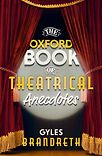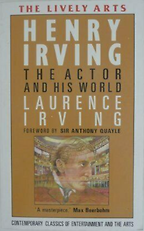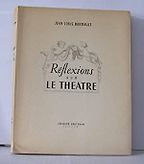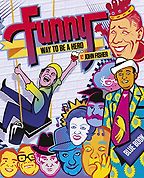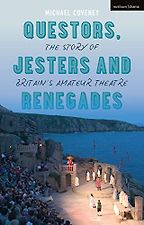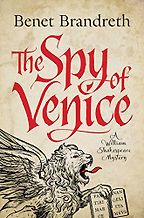You tell me that you have a personal collection of more than a thousand books on the theatre. Was it tricky to select your five favourites?
It was very easy. I’ve been collecting books on the theatre since I was a little boy – six or seven years of age. So we’re talking over 60 years that I’ve been acquiring theatre books: new ones, old ones, second hand ones. And I’ve inherited a few.
I was a friend of a very great actor, Sir Donald Sinden, who introduced me to the delights of theatrical anecdotes. He also gave me a few books. I was also friends with a lovely actor called Frank Thornton, whose 100th birthday would have fallen this January. He and his wife were members of Donald Wolfit’s company during the Second World War, and he gave me some of his theatre books. So I have several thousand books on the theatre in my house. So you could say I’m spoilt for choice; I could play this game all day, every day, until the day I die. And in a way I am, because I’m dipping in and out of my favourite theatre books all the time.
You mentioned anecdotes – let’s touch on your new book, which is out now. This is The Oxford Book of Theatrical Anecdotes.
This is 500 years of going to the theatre in one book. It’s been a wonderful project to finalise in a year when we haven’t been able to go to the theatre at all.
An anecdote is a moment in time that, for me, epitomises the essence of the subject. In this case, the theatre. So it’s basically 800 pages of stories dating from Shakespeare’s day to the present day, that give you a flavour of theatre people and theatre itself.
Because it’s published by Oxford University Press, the challenge was that it all had to be authenticated. It couldn’t just be my favourite stories. It’s not just jolly fun, me telling you amusing stories – although I have quite a few – they all had to come from somebody’s diary or journal, or a book written at the time, so they had what auctioneers call ‘provenance’.
Get the weekly Five Books newsletter
One of the great themes that came through was: the show goes on, come what may. Well, we’ve had a terrible time this year, but they’ve had terrible years before – and not only on account of the plague. The time theatres were closed for the longest period was during the Commonwealth of Oliver Cromwell, when I think theatres were shut for eight years or more. But when they reopened, that’s when we had Restoration Comedy, and a flourishing of laughter. So there’s always hope, light at the end of the tunnel.
So, yes, the idea is 500 years of theatre: history, personalities… not just actors, but playwrights, producers, directors, prompters, spear carriers, audiences, and even – briefly, during the interval – I let the critics in. We don’t give them much time. (That said, my collection of theatre books of course includes dozens of volumes by critics: James Agate, Kenneth Tynan, Michael Billington.)
Let’s move onto those theatre book recommendations. Your first choice is the biography of Henry Irving, The Actor and His World. It can be a little tricky to get hold of, but I see used copies available on Amazon and Abe Books.
Probably the first biography of an actor I bought, when I was about ten, was a biography of Laurence Olivier by Felix Barker. When I was eight, nine, ten, Laurence Olivier was my great hero. I’ve got a whole shelf of books about Laurence Olivier.
I then went on to write a biography of John Gielgud, and I’ve got an even longer bookshelf of books on Gielgud. So, I have a lot of books about actors of that vintage: Olivier, Gielgud, Ralph Richardson, Michael Redgrave. And several shelves of books on Noël Coward, who was not only an actor, but a playwright and composer. And a remarkable human being.
But I’ve picked Henry Irving’s because I think it was the first substantial theatrical biography that I read. It’s written by his grandson, Laurence Irving, and was published in 1951. It’s a monumental work, running to many hundreds of pages. I bought it second hand, and amazingly I found a letter inside it from Henry Irving himself.
“There are people who thought he was a sort of mesmerist – that he somehow hypnotised the audience”
It’s a beautifully written book. Of course, Laurence Irving admired his grandfather who, as you know, was the first actor to receive a knighthood. His knighthood was announced on the very day that Oscar Wilde was sent to jail for two years; the two news items appeared in the same paper, in 1895.
As the first actor to receive a knighthood, the fascination of Irving is very great. How did he do it? He wasn’t particularly handsome. Some say he had a slight speech impediment. He had a strange gait. There are people who thought he was a sort of mesmerist – that he somehow hypnotised the audience, controlled huge audiences. This is a book that explores that. It’s got wonderful photographs of him in his great roles. He spanned the 19th century and the beginning of the 20th century.
In a way, reading that book introduced me to that late-Victorian world. It’s still, for me, probably the best theatrical biography. I mean, there are so many, I could list you 100 of the top theatre biographies. But this, I think, is my favourite.
It’s also got a wonderful epigraph, that I often quote, by Robert Louis Stevenson:
[T]he great man produces beauty, terror, and mirth[. T]he little man produces cleverness… instead of beauty, ugliness instead of terror, and jokes instead of mirth
So there you are. He could produce beauty, terror and mirth. That was Henry Irving.
Next you want to recommend Réflexions sur le Théâtre, by Jean-Louis Barrault, published in 1949.
This dates from my childhood. I went to the French Lycée in London, and used to go on French exchanges. My hero in Britain was of course Laurence Olivier, and I quickly discovered that in France, the great actor was Jean-Louis Barrault; he was France’s Olivier.
When I was a teenager, I got a summer holiday job in Switzerland. I stayed with a family, speaking English to their children, and learning French from them. The mother of the household had been an actress, Gabrielle de Tourbillon. As I left, she gave me a present, and it was this book: Réflexions sur le Théâtre. What is amazing is that he, Jean-Louis Barrault, had given it to her. There’s a charming message inside, to Mme Tourbillon, then one from her handing the book on to me.
It’s a fascinating book. Basically it’s his autobiography, but also it gives you a very different approach to theatre. It introduced me to the serious intent of French theatre. There’s a different style of acting in France, or there used to be.
Five Books interviews are expensive to produce. If you're enjoying this interview, please support us by donating a small amount.
Just as I’d been a sort of groupie to Laurence Olivier and Vivien Leigh and Joan Plowright, I became a groupie to Jean-Louis Barrault and his wife Madeleine Renaud. I would go to the theatre in Paris when they were performing. I learned something very interesting from Jean-Louis Barrault: during the 1960s, when there were riots, he put on a play in a boxing ring. It was amazing. He made the point that theatre is not about the building – it’s about what’s happening on the stage. So I choose this one because it introduces us to a different kind of world.
The French, they have Racine. This extraordinary poetry. It works quite differently to the way Shakespeare works. The comedy of Molière works differently to our … no, actually, Moliere is more like our comedy, but Corneille, Racine, are totally different, and this book introduced me to them.
I still go to the theatre in Paris whenever I can.
Next you want to recommend John Fisher’s Funny Way to be a Hero.
Oh, yes. Do lots of people choose this?
I think it’s the first time it’s been recommended on the site. But I have read that it’s meant to be the finest book ever written on 20th century comedy.
That sounds right to me. I first got it when it came out in 1973. I was writing a biography of Dan Leno, the great Victorian star – the Henry Irving of the music hall. Just as Marie Lloyd was the Ellen Terry of the music hall. Dan Leno was, when he died, the most famous person in the country after the Queen. Have you even heard of him?
I have to admit I haven’t.
When he died, people lined the 16-mile route of his funeral. It was a front page event. He was a national hero. I wrote his biography 50 years ago when he was still quite well known. He’s now totally forgotten.
But I wanted to immerse myself in other music hall stars of the period, and discovered this book. John Fisher had done all that. He introduced me in his first edition to people from the Victorian, Edwardian age. Indeed on the original cover, it read: “John Fisher presents Funny Way to Be a Hero, being a penetrating analysis of half a century of British music hall comedy featuring Billy Bennet, Flanagan and Allen, Will Hay, Max Miller, Robb Wilton, Frank Randle, Dan Leno … and other distinguished entertainers in a modern vein.” I thought: this is the book for me. It brought the music hall to life in the way that Laurence Irving’s book about his grandfather brought Victorian theatre to life, and Jean-Louis Barrault brought French theatre to life.
“A friend of mine, a member of parliament, borrowed this book and never returned it”
He did another edition, a new edition, which is the one I now have, because my original edition was stolen when I was an MP. A friend of mine, another MP, borrowed it and never returned it. Do not lend books! But I do have the new edition from 2013, which is beautiful, with wonderful illustrations.
It’s just fantastic. The greatest book on music hall comedy ever written. It tells you about everyone you want to know about, and gives you a flavour of what they were like. Because with people like Dan Leno, there’s no film of him. There are some audio recordings, but they’re very scratchy. So this is your gateway to music hall.
Fantastic. So you’ve chosen some real classics. But the next theatre book you want to recommend brings us bang up to date. This is Questors, Jesters and Renegades: The Story of Britain’s Amateur Theatre, by Michael Coveney.
I now realise that I’ve picked out five books that take you into different worlds: books that introduce you to the five key elements of theatre, in my opinion. One is the tradition of acting from Henry Irving, the second is the French school with Jean-Louis Barrault, the third is music hall and comedy, and this is amateur theatre.
It was written by a friend of mine, Michael Coveney, who was a theatre critic. I have his collections of criticism, including one of his very amusingly entitled The Aisle is Full of Noises.
Very funny.
As in, The Tempest. Yes.
I first met Michael Coveney when we were at university together. I put on a production of a Victorian version of Cinderella, by H J Byron – not the poet, his less well-known cousin. But who I reckon gave more happiness to the world than Lord Byron. H J Byron gave us Widow Twanky. He invented the character of Buttons.
Really!
Anyway, Michael Coveney has written a number of wonderful books, including a great biography of Maggie Smith. But this new book is called Questors, Jesters and Renegades: The Story of Britain’s Amateur Theatre.
What I love about this book is that it isn’t snobbish at all. It’s a celebration of amateur theatre across the centuries, and there have been some marvellous, talented actors.
My father was a lawyer. He wanted to be an actor, but it wasn’t to be: his parents wanted him to be a solicitor. All his life, though, he was a splendid amateur actor. I loved going as a child to see amateur actors at work.
“If we’re going to have a collection that gives you a picture of the world of theatre, you need this in your collection”
And then I found myself working with a wonderful double act called Hinge and Bracket. They were a double act: Dame Hilda Bracket and Dr Evadne Hinge. They were a drag act, but not a normal drag act. They played a couple of elderly musical ladies, and were very popular in the 1970s, ’80s and ’90s. I wrote a sitcom for BBC Two called Dear Ladies with them. My point is, the characters they played were great musical enthusiasts and loved the world of Gilbert and Sullivan, amateurs putting on Puccini’s Madama Butterfly… they spoofed the world of amateur theatre. So I love the idea of amateur theatre, both when it’s spoofed and the real thing.
There are still a remarkable number of amateur theatres in this country, and what I learned from Michael’s book is how old the tradition really is. It really developed from medieval guilds predating Shakespeare. And, of course, many of the people involved in the founding of the National Theatre were enthusiasts of amateur theatre. So it was the first proper account of amateur theatre. If we’re going to have a collection that gives you a picture of the world of theatre, you need it in your collection.
Speaking of the National Theatre, their website notes that “amateur theatre is not just something that serves as a popular pastime: it has been an instrumental part in the development of 20th and 21st century professional theatre”. Do you agree?
Well, what I don’t like is the snobbery that exists around it. I mean, amateur theatre is the true ‘national theatre’, because there are more amateur companies in the country than professional ones. They are creating and celebrating theatre.
But we have to acknowledge that, on the whole, amateur theatre is a different phenomenon. It’s there for the audiences to enjoy, but it’s also a kind of social exercise. Like singing in a choir. It has a cultural purpose that is different to professional theatre. But I love it.
I love nothing more than an amateur production of A Midsummer Night’s Dream. In fact, we’ve been celebrating amateur theatre since Shakespeare wrote A Midsummer Night’s Dream, for what are the Rude Mechanicals but amateur theatre? Without amateur theatre, we wouldn’t have Bottom. We wouldn’t have Pyramus and Thisbe and the Wall. So it’s part of the story of theatre. We’ve been poking affectionate fun at the expense of amateur theatre for hundreds of years, and this book celebrates that brilliantly.
How joyous. I think that brings us quite neatly to our final book. This is The Spy of Venice, and I can’t help but notice that it’s written by a Brandreth.
I have, of course, several walls of books about Shakespeare, partly because I began writing my first biography of Shakespeare when I was ten. Still got it somewhere. My favourite book about Shakespeare is a book by John Masefield, called William Shakespeare, and it’s basically a guide to every one of the 37 plays – with the plays he may have part-written, that’s about 41 plays, and the poems as well. He tells you the history of the play, the plot summary, then he gives you his critical analysis of it. It’s a short and beautiful book.
You name it, I’ve got every book on Shakespeare you can imagine, including Emma Smith’s, which is on my bedside table at the moment. There are many good biographies of Shakespeare, including one by Anthony Burgess and another by Anthony Holden. But what’s amazing about Shakespeare is that though we know very little about him, he seems to know everything about us. That’s extraordinary.
But I wanted to give you a book that gave you Shakespeare’s world, and happily I have the answer. If the first four books introduced you to the world of British, French, music hall and amateur theatre, this last book introduces you to the world of William Shakespeare. Who was he? What was he like? We can’t know for sure, because we haven’t got enough information. We can only know him in the world of the imagination.
I’m blessed in having a brilliant son who is by day a barrister – he’s a QC – but also a bit of a Shakespeare scholar. He’s rhetoric coach at the Royal Shakespeare Company, among others, and he teachers rhetoric at drama schools.
Rhetoric, as you know, was a mainstay of education in Shakespeare’s day. And when my son Benet was a little boy, we used to have a house in Stratford-upon-Avon overlooking the church where Shakespeare’s body now lies. So we brought our children up on Shakespeare, and Shakespeare is the foundation of everything. He is the reason that this country is preeminent in theatre globally. Shakespeare is the ultimate.
So my son, boldly, amazingly, has written two novels: the first is called The Spy of Venice and it’s a playful and inventive novel about Shakespeare as a young man, escaping from Anne Hathaway and Stratford-upon-Avon and disappearing to Italy, to Venice, to seek his fortune. As a family we’ve always been fascinated by what Shakespeare did during the ‘missing years’.
He meets up with a character who you might see one day as being the basis of John Falstaff. It’s a wonderful late-16th century romp, where you get the world, the wit of William Shakespeare, and – if you are a Shakespearean groupie – you get the pleasure of recognising subtle references to the places where he might be getting ideas for characters that he uses in later years.
It’s clever in the sense that he uses the vocabulary that was available to Shakespeare, no modern words. It’s the first of two novels – the second is called The Assassin of Verona – and as well as being a rattling good yarn it gives you an unexpected insight into the world of young Will Shakespeare.
And, at the end of the interview, I say: the rest is silence.
Interview by Cal Flyn, Deputy Editor
January 18, 2021. Updated: January 20, 2021
Five Books aims to keep its book recommendations and interviews up to date. If you are the interviewee and would like to update your choice of books (or even just what you say about them) please email us at [email protected]

